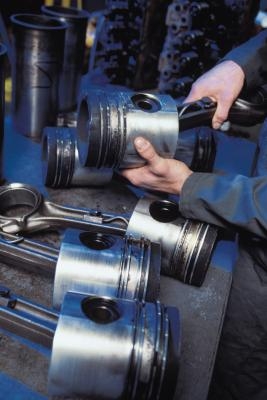
Cast aluminum pistons aren't the best out there, but most cars have them. The cast piston's secret lay in its economy, since a cast piston will perform adequately under most circumstances. The cast material's soft and porous nature makes removing built-up carbon, varnish and oil gunk a somewhat time-consuming procedure. However, it's all simple as long as you have the right tools and are willing to put some time into it.
Place your pistons into a baking pan or coffee can and then fill the pan up with liquid carburetor cleaner until it submerges the pistons. If you don't have carburetor cleaner, then acetone, naphtha solvent or paint thinner will work. Cover the pan or can with tin foil to keep the solvent from evaporating away, and allow it to sit overnight.
Remove the pistons from the solvent bath and wash them with dish detergent and water. Use the paintbrush to remove stuck-on deposits. You may find that this is as far as you need to go, since an overnight solvent bath and a good scrub should eliminate most of the deposits. If not, then dry the pistons with an air-sprayer attachment and proceed to step three.
Load your sandblasting reservoir with baking soda, trigger the gun to purge any excess sand and get your pistons handy. Soda-blast the tops, bottoms, recesses and ring lands in the pistons. Baking soda is a very gentle medium, use a bit more pressure than you would use when using sand. Avoid hitting the inside of the wrist pin bores just to be safe.
Submerge the pistons in warm or boiling water. This is where baking soda really shines, because -- unlike sand -- it readily dissolves in water. Dissolving the baking soda will ensure that you don't end up with any baking soda blocking the small oiling passages in your pistons. If you want to be double sure, dunk the pistons in a 50-50 solution of vinegar and water and then wash them again.